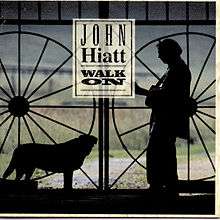Walk On (John Hiatt album)
Walk On was singer-songwriter John Hiatt's thirteenth album, released in 1995. It was his first album with Capitol Records.
| Walk On | ||||
|---|---|---|---|---|
 | ||||
| Studio album by | ||||
| Released | 24 October 1995 | |||
| Genre | Folk rock, heartland rock | |||
| Length | 68:57 | |||
| Label | Capitol | |||
| Producer | Don Smith | |||
| John Hiatt chronology | ||||
| ||||
| Review scores | |
|---|---|
| Source | Rating |
| AllMusic | |
Track listing
All tracks written by John Hiatt
- "Cry Love" – 4:20
- "You Must Go" – 5:01
- "Walk On" – 5:11
- "Good as She Could Be" – 3:28
- "The River Knows Your Name" – 4:25
- "Native Son" – 3:55
- "Dust Down a Country Road" – 4:04
- "Ethylene" – 4:03
- "I Can't Wait" – 4:25
- "Shredding the Document" – 5:02
- "Wrote It Down and Burned It" – 6:02
- "Your Love Is My Rest" – 4:34
- "Friend of Mine" – 14:22 (The song "Friend of Mine" ends at 3:22. After 2 minutes [3:22 – 5:22] begins the hidden song "Mile High" [5:22 – 14:22], included on the Capitol release but not mentioned, listed as bonus track on the European and BMG releases)
Personnel
- John Hiatt – electric guitar and acoustic guitar, vocals, electric piano, Wurlitzer
- Davey Faragher – bass guitar, background vocals
- David Immerglück – electric guitar, slide guitar, mandolin, pedal steel guitar, three-stringed guitar, background Vocals
- Michael Urbano – drums, percussion
- Additional musicians
- Lisa Haley – violin on "Walk On" and "The River Knows Your Name"
- Gary Louris – background vocals on "You Must Go"
- Mark Olson – background vocals on "You Must Go"
- Bonnie Raitt – background vocals on "I Can't Wait"
- Benmont Tench – piano and harpsichord on "Shredding the Document" and pump organ on "The River Knows Your Name"
- Production
- Don Smith – producer, mixer
- Tim Devine – executive producer
- Gary Gersh – executive producer
- Davey Faragher – associate producer
- Shelly Yakus – mixer
gollark: It reminds me of the plethora portable keyboard thing.
gollark: I never actually did this, but it might have been cool to.
gollark: A nice thing about DFPWM is that you could theoretically encode it from CC, since the codec was very simple.
gollark: Is that a problem? You can just extract free capital from them.
gollark: I used my own highly efficient™ program which just downloads an entire 10MB tape file into memory.
External links
This article is issued from Wikipedia. The text is licensed under Creative Commons - Attribution - Sharealike. Additional terms may apply for the media files.